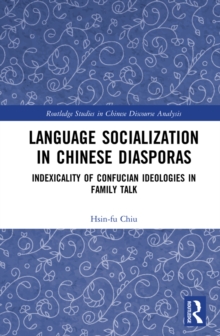
Inclusivity and Belonging in Chinese Discourse : The Case of ta PDF
by Kerry Sluchinski
Part of the Routledge Studies in Chinese Discourse Analysis series
Description
Inclusivity and Belonging in Chinese Discourse explores how recent language change in the third-person pronoun system of Mandarin Chinese is harnessed by netizens to construct spaces of (non-)belonging along a fluid continuum in the context of pro- and anti-LGBTQ discourses.
Grounded in stance, framing, and positioning theories, the monograph contributes to the notions of membership categorization and (co-)reference chains for identity construction. With a focus on newly emergent genderless third-person pronoun ta, written in pinyin, and the various noun and verb phrases which co-occur with the pronoun in specific contexts, this monograph shows how ta has become a conventionalized language practice accepted and implemented by language users of various identities, sexual orientations, and backgrounds for a vast array of interactional and communicative purposes. The monograph illustrates how ta is used in doing identity construction work for the self, another party involved in the interaction, and/or a third party external to the interaction, often simultaneously. That is, the specific function and referent of ta is defined through language users' unique interpretations and the discourse community of use, resulting in a 'chameleon-like' pragmatically loaded pronoun which reflects the inherent fluidity of identity(ies).
This monograph will appeal to scholars, language researchers, and advanced graduate students concerned with inclusive language use in the Chinese context, particularly within discourse analysis, linguistics, sociolinguistics, and semantics. The book will also be valuable to professionals concerned with inclusive language and identity construction.
Information
-
Download - Immediately Available
- Format:PDF
- Pages:280 pages
- Publisher:Taylor & Francis
- Publication Date:31/01/2024
- Category:
- ISBN:9781003831402
Other Formats
- Hardback from £130.00
- EPUB from £31.58
Information
-
Download - Immediately Available
- Format:PDF
- Pages:280 pages
- Publisher:Taylor & Francis
- Publication Date:31/01/2024
- Category:
- ISBN:9781003831402










